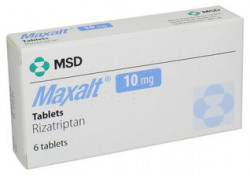Maxalt (rizatriptan) Coupons, Discounts & Cost
Maxalt is an antimigraine drug containing rizatriptan. The agent helps narrow blood vessels during a migraine attack. One way to save money on the Maxalt (rizatriptan) retail cost regardless of income and insurance status is to use Maxalt (rizatriptan) coupons or discount cards from RXCoupons. Use our Maxalt (rizatriptan) coupons at your online pharmacy and receive up to 75% off the sale price each time you refill your prescription.
Maxalt active substance
Maxalt is an antimigraine drug containing rizatriptan. The agent helps narrow blood vessels during a migraine attack.
When Maxalt is contraindicated
The following conditions may restrict you from taking Maxalt:
Hypersensitivity, MAO inhibitors, hypertension, coronary insufficiency, myocardial infarction, asymptomatic ischemia, Prinzmetal angina, basilar and hemiplegic migraine, age up to 18 years. Caution should be used during pregnancy, lactation.
Maxalt dosage and administration
Patients may take Maxalt tablets with an interval of not less than 2 hours. The single dose of rizatriptan is 10 mg. The maximum daily dose of rizatriptan is 30 mg. The initial dose for patients taking propranolol is 5 mg (15 mg daily dose). The effect is obtained 30 minutes after administration.
Rizatriptan oral tablets stop attacks of migraine without being taken with water. This helps the patient prevent possible deterioration of gastrointestinal functions caused by swallowing liquids.
Patients with CHD risk (including hypertension, diabetes, severe coronary artery disease) should monitor the cardiovascular system before starting treatment.
Maxalt possible side effects
The following conditions may occur when taking Maxalt:
Dizziness, drowsiness, headache, weakness, fatigue, chest pain, abdominal pain, palpitations, tachycardia, nausea, vomiting, dry mouth, diarrhea, dyspepsia, neck pain, myasthenia gravis, paresthesia, decreased mental activity, insomnia, hyperesthesia, tremor, ataxia, anxiety, disorientation, discomfort in the throat, shortness of breath, redness and itching of the skin, increased sweating, blurred vision, increased AD.
Nervous system: dizziness, headache, drowsiness or insomnia, weakness, fatigue, decreased alertness, disorientation, anxiety, paresthesia, hyperesthesia, blurred vision.
Cardio-vascular system: high blood pressure, palpitations, tachycardia.
Digestive tract: dry mouth, nausea, vomiting, diarrhea, dyspepsia.
Musculoskeletal system: muscle weakness, muscle rigidity, tremor, ataxia.
Allergic reactions: redness and itching of the skin.
Other reactions: discomfort in the throat, thirst, pain in the neck, pain in the chest, abdominal pain, fainting, shortness of breath, excessive sweating, hot flushes.
How to use Maxalt during pregnancy and breastfeeding
Maxalt may be used in pregnant women only if the expected effect of therapy outweighs the potential risk to the fetus. No adequate and well-controlled studies performed in pregnant and lactating women.
Maxalt overdose symptoms
The following conditions may occur when overdose: dizziness, drowsiness, bradycardia, vomiting, urinary incontinence.
Treatment: gastric lavage, activated charcoal.
Maxalt interaction
MAO inhibitors and propranolol increase rizatriptan concentration in the blood. Do not use this drug simultaneously with other 5-HT1D receptor agonists (triptans). There are limited data on the use of rizatriptan in the elderly. The drug may be used no earlier than 2 weeks after the end of treatment with MAO inhibitors.
Maxalt warnings
The drug should be prescribed only to patients with migraine diagnosis. The drug should not be prescribed to patients with basilar or hemiplegic migraine.
The drug should not be used for treatment of atypical headache (associated with potentially serious medical conditions: acute cerebral circulatory disorders, ruptured aneurysm).
Rizatriptan may cause pain and tightness in the chest. If these symptoms indicate the presence of coronary artery disease, the drug should not be used.
Rizatriptan should not be given to patients with suspected undiagnosed heart disease or patients with hypertension, diabetes, smokers. The therapy should be avoided in men older than 40 years, postmenopausal women, patients with severe coronary artery disease and diagnosed coronary atherosclerosis.

